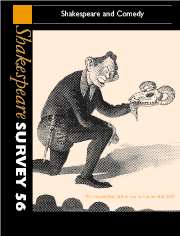Book contents
- Frontmatter
- Looking Like a Child – or – Titus: The Comedy
- Comedy and Epyllion in Post-Reformation England
- (Peter) Quince: Love Potions, Carpenter’s Coigns and Athenian Weddings
- ‘When Everything Seems Double’: Peter Quince, the other Playwright in A Midsummer Night's Dream
- Cultural Materialism and Intertextuality: The Limits of Queer Reading in A Midsummer Night's Dream and The Two Noble Kinsmen
- As You Liken It: Simile in the Wilderness
- Infinite Jest: The Comedy of Hamlet, Prince of Denmark
- Othello and the End of Comedy
- Shakespeare as a Joke: The English Comic Tradition, A Midsummer Night’s Dream and Amateur Performance
- Falstaff’s Belly, Bertie’s Kilt, Rosalind’s Legs: Shakespeare and the Victorian Prince
- The Sixth Act: Shakespeare after Joyce
- The Return of Prospero’s Wife: Mother Figures in The Tempest’s Afterlife
- Directing Shakespeare’s Comedies: In Conversation with Peter Holland
- ‘To Show our Simple Skill’: Scripts and Performances in Shakespearian Comedy
- John Shakespeare’s ‘Spiritual Testament’: A Reappraisal
- Shakespeare as a Force for Good
- Timon of Athens and Jacobean Politics
- Man, Woman and Beast in Timon’s Athens
- Rough Magic: Northern Broadsides at Work at Play
- Shakespeare Performances in England, 2002
- Professional Shakespeare Productions in the British Isles January–December 2001
- The Year's Contributions to Shakespearian Study 1 Critical Studies
- 2 Shakespeare’s Life, Times and Stage
- 3 Editions and Textual Studies
- Books Received
- Index
Infinite Jest: The Comedy of Hamlet, Prince of Denmark
Published online by Cambridge University Press: 28 March 2007
- Frontmatter
- Looking Like a Child – or – Titus: The Comedy
- Comedy and Epyllion in Post-Reformation England
- (Peter) Quince: Love Potions, Carpenter’s Coigns and Athenian Weddings
- ‘When Everything Seems Double’: Peter Quince, the other Playwright in A Midsummer Night's Dream
- Cultural Materialism and Intertextuality: The Limits of Queer Reading in A Midsummer Night's Dream and The Two Noble Kinsmen
- As You Liken It: Simile in the Wilderness
- Infinite Jest: The Comedy of Hamlet, Prince of Denmark
- Othello and the End of Comedy
- Shakespeare as a Joke: The English Comic Tradition, A Midsummer Night’s Dream and Amateur Performance
- Falstaff’s Belly, Bertie’s Kilt, Rosalind’s Legs: Shakespeare and the Victorian Prince
- The Sixth Act: Shakespeare after Joyce
- The Return of Prospero’s Wife: Mother Figures in The Tempest’s Afterlife
- Directing Shakespeare’s Comedies: In Conversation with Peter Holland
- ‘To Show our Simple Skill’: Scripts and Performances in Shakespearian Comedy
- John Shakespeare’s ‘Spiritual Testament’: A Reappraisal
- Shakespeare as a Force for Good
- Timon of Athens and Jacobean Politics
- Man, Woman and Beast in Timon’s Athens
- Rough Magic: Northern Broadsides at Work at Play
- Shakespeare Performances in England, 2002
- Professional Shakespeare Productions in the British Isles January–December 2001
- The Year's Contributions to Shakespearian Study 1 Critical Studies
- 2 Shakespeare’s Life, Times and Stage
- 3 Editions and Textual Studies
- Books Received
- Index
Summary
This cartoon (illustration 15) appeared in the London Evening Standard on 16 March 2001. It is, I suppose, instantly recognizable as a reference to Hamlet: we know this from the man's costume, the fact that he is holding a skull, and the caption, which is clearly a parody of 'To be or not to be' (Hamlet 3.1.56). If someone were to come across this cartoon in the archives of the Evening Standard in say fifty or one hundred years' time, it would still be obvious that it is a reference to Hamlet.
What would by then need annotation is the immediate context of the cartoon: one would need to explain that the figure represents Tony Blair, the Prime Minister of the United Kingdom at the time, and that the cartoon was published during a period when there was widespread speculation that he would call a General Election on 3 May. One would need to explain further that the object he is holding is the skull of a sheep and that the reason why he was being indecisive about the date was the epidemic of foot and mouth disease which was sweeping the country during the Spring of 2001: apart from the extent to which the election might have been seen as an unnecessary distraction at a time of national crisis, there was the practical consideration that the movements of both politicians and voters would be restricted. On the other hand, postponing the election would send a negative message to potential business investors and tourists.
- Type
- Chapter
- Information
- Shakespeare SurveyAn Annual Survey of Shakespeare Studies and Production, pp. 93 - 104Publisher: Cambridge University PressPrint publication year: 2003
- 1
- Cited by



